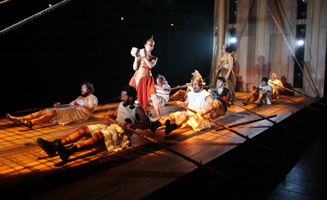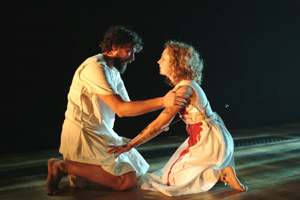
Dorothy Chansky
"Argonautika: The Voyage of Jason and
the Argonauts"
 |
| Here,
the Argonauts receive divine guidance through treacherous seas by Athena,
played by Mariann Mayberry (standing, center) and Hera (Lisa Tejero, behind.) Photo Credit: Liz Lauren |
Lookingglass Theatre Company
821 North Michigan Avenue
Chicago, Illinois 60611
October 18-December 23, 2006
Box Office: (312)337-0665 or www.lookingglasstheatre.org
by Dorothy Chansky
Face it, we all know two Jasons. There's the brave hunk who assembles
a band of fearless adventurers and goes after the Golden Fleece against
all odds. Then there's the slimy opportunist who dumps Medea, using
pseudo-logic to argue the merits of a trophy wife who comes with a fortune
roughly the size of a small kingdom.
Mary Zimmerman's project in the eye-poppingly creative
"Argonautika" is to tell these two stories as one, albeit one
that spends most of its time on the fleece-gathering mission.
Because love and power are two obsessions that can turn people into fanatics,
both are problematized as sometimes good / sometimes bad. What's tricky
is figuring out which side is up when. Jason gets it as right as most mere
mortals, but there's the rub. Humans are driven by feelings we can't
always understand or control. In this captivating production, passions and
ideals are personified as goddesses who wield power and pull strings, but
who are themselves subject to fits of pique and tantrums when they aren't
getting enough obeisance.
"Argonautika" opens with Jason helping an old woman traverse a stream by carrying her on his back. He loses a sandal on the way. Boyscout assists little old lady crossing a street, right? But this little old lady is the goddess Hera (Lisa Tejero) in disguise, and once across the river she emerges in splendid regalia, exiting in triumph on the shoulders of two minions, looking for all the world like an odalisque ready for her next conquest. The lost sandal is retrieved by Athena (Mariann Mayberry), who also exits on the shoulder of a hefty flunky, lying on her stomach as if swimming forward and pointing the way with her spear. Both goddesses help Jason. And he turns out to need all the help he can get.
His uncle Pelias (Allen Gilmore), you see, is an unbalanced opportunist, who has already fouled the nest by usurping the throne and pushing aside the rightful heir, Jason's father. This Pelias is a megalomaniac in a crown with melting points and a white beard down to the floor. (Think Antonio Gaudí, and tip your hat to costume designer Ana Kuzmanic) Certain that it's a suicide mission, Pelias sends Jason after the missing fleece, which belongs to a nasty sheep that abducted two innocent children years ago. Jason, (mis)taking the mission as a point of honor, agrees to go. Ryan Artzberger's Jason is alternately earnest, arrogant, confused, jazzed, and tired, just as he should be.
 |
| Ryan Artzberger and Atley Loughridge. Photo by Liz Lauren |
"Argonautkia"'s theatrical riches emerge in the monsters, gods, muscle-man heroes, mythical kingdoms, and various possessors of supernatural powers that make the journey a whopping good story. Take Phineas, for instance. The poor guy was doomed to remain alive forever but always hungry. The three harpies who torment him here are fanciful bird-like puppets on long poles. They circle their victim, leaving (paper) droppings all over the stage and snatching up Phineas' food with their hinged, working beaks. Or consider the sea monster Hercules has to obliterate so the Argo can get across the ocean. It's huge, all right. An enormous piece of green fabric comes to life with a couple of actors hiding and moving underneath it, creating a megablob with two scary, bloodshot eyes made of painted, handheld softballs wielded by one of the actors under the fabric. Hercules lobs a (papier-maché) boulder from a balcony, and voilà! The eyeballs go flying, the fabric is whisked into a trapdoor on the stage floor, and bye bye monster.
You really want Jason to find that fleece, especially after seeing his parents kill themselves and Jason's infant brother rather than die at the hands of the scheming, evil Pelias. And you feel for Medea (Atley Loughridge), here a scary, intense teenager who's into tattoos, drugs, mumbled spells, and lurking in corners. After all, her father's a sadistic bully and her brother is dad's yes man. On top of that, Cupid delivers an arrow that goes right through her torso. Lest we forget how powerful an effect such a shot can have, the arrow becomes a permanent costume item for Medea for most of the time she is onstage. Cute at first, and then an ineradicable curse.
Jason's shift from hero to heel happens in mere seconds. The fleece mission has ended, and we have a hint that all may have been for naught, as mean old Pelias has simply died while Jason was away, ending the need to overthrow or placate him. As Jason and Medea face each other, the moment that was the voyage's end segues into the moment at which Jason announces that he's leaving her for a younger woman. The teenage princess who staked everything on love is suddenly an abandoned matron. The hero who never really quite did know what was the honorable thing to do is now rudderless. You know the rest.
Or do you? Here's the lesson Zimmerman's Jason learned: What's important is to become a man, defend the nation, destroy the "other," and end evil. But, as the goddesses note, heroes often end up like Jason in the end---old, childless, friendless, and passed by. What's the lesson we're supposed to learn? Well, not to put too fine a point on it, but one lesson is that better theatre comes from better imaginations, and they don't get any better than Mary Zimmerman's. Defaulting to realism and illustrative design in the name of "authenticity" seems pointless in Zimmerman's world of athletic bodies, choral speaking, protean swaths of fabric, and playfulness that goes without saying.
"Argonautika" is not intended as a lesson in auteur directing, of course. Its final moments use a well-worn epilogue trope and tell us what happened to the various Argonauts whom we've come to know a bit through their individual personalities and adventures. They all died, of course, some on the voyage and some long after. But one by one, they come back to life as stars. The twin fighters Castor and Pollux are the constellation Gemini. Young Hylas, who suffered a watery death at the hands of a nymph in a lake, is Aquarius. The actors who played the Argonauts return to the stage bearing strings of lights that they arrange individually as the Zodiac constellations they have become.
And here's the other lesson. Any time you think that
what's important is to become a man, defend the nation, destroy the
other, or go after the fleece at all costs, look up in the night sky. Those
stars that make us think cosmic thoughts have been around long enough to
have seen that, mostly, "heroes" cause death, win pyrrhic victories,
defeat bad guys by allying themselves with other bad guys, and invoke women
and children for the sake of expedience.
--Dorothy Chansky

| museums | NYTW mail | recordings | coupons | publications | classified |